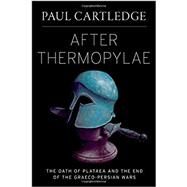After Thermopylae The Oath of Plataea and the End of the Graeco-Persian Wars
, by Cartledge, Paul- ISBN: 9780199747320 | 0199747326
- Cover: Hardcover
- Copyright: 6/6/2013
Like the World War II battles of Kursk and the Leyte Gulf, Plataea is one of those unjustly forgotten conflicts in military history. Its neglect is especially ironic since the Greeks' victory there in 479 BC brought a major war with the Persian Empire, a true clash of civilizations, to a conclusion. Plataea, located just south of Thebes, was a massive land battle involving tens of thousands of combatants on each side. To the Spartans, who provided the largest single contingent of the Greek forces, along with its overall command and leadership, the victory was vengeance paid for their heroic but wholesale defeat at Thermopylae the previous year. What exactly happened on the plain of Plataea, and why has this Spartan victory been relatively overlooked by history? Part of the answer to these questions can be found in a little-known oath reputedly sworn by the leaders of several Greek city-states prior to the battle. Paul Cartledge, a renowned authority on Greek history, uses this document to give as detailed an account as possible of the battle of Plataea. He resurrects the battle's significance in the Persian Wars and in Greek history more broadly. The oath, the wording of which survives in several versions from the fourth century BC and later, tells us much about the early Greek mythology of the wars, and even how the Greeks thought about memorializing these events for posterity. Although a significant number of Greek cities fought side by side against the invading Persians, a good number held aloof, and those that did nerve themselves to fight did not always agree about the meaning of these events or how they should be commemorated. As with much ancient Greek history, the Athenians and Spartans competed for control for this past, and judging from the fact that the Athenian victories at Marathon and Salamis have overshadowed the Spartan victory at Plataea we can see that Athens won this propaganda war. The oath of Plataea vividly illuminates Greek anxieties over historical memory and the Atheno-Spartan rivalry which would erupt fifty years after Plataea in the Peloponnesian War. Lastly, because the oath is ultimately a religious document sworn before the Olympian gods it offers insight into the role of religion in ancient Greek politics. After Thermopylaeprovides a long-overdue history of an important battle and offers a rich portrait of the Greek ethos during one of the most critical periods in ancient history.






